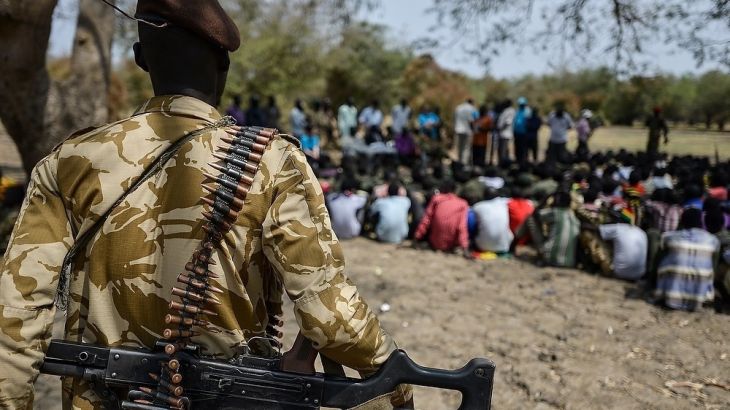UN: Over 100 sexual assault cases in South Sudan’s Juba
Report details “deeply disturbing” cases of rape and gang-rape by soldiers and men in plain clothes in Juba.

The UN says there have been at least 120 cases of sexual violence and rape against civilians in South Sudan’s capital Juba since fighting broke out three weeks ago between troops loyal to the country’s rival leaders.
Heavy fighting involving tanks and helicopters raged in Juba for several days between troops loyal to President Salva Kiir and those backing Vice President Riek Machar earlier this month.
Keep reading
list of 4 items‘Children of the Ganges’ — The boatmen of India’s Varanasi
US senators call on Biden to sanction Sudan’s RSF over human rights abuses
Israeli attack kills 10, mostly children, in Gaza’s Rafah
At least 272 people were killed before the leaders ordered a ceasefire.
Farhan Haq, UN spokesperson, said on Wednesday the UN peacekeeping mission in South Sudan continued to receive “deeply disturbing reports of sexual violence, including rape and gang rape, by soldiers in uniform and men in plain clothes against civilians, including minors, around UN House and in other areas of Juba.”
Haq said UN peacekeepers had stepped up patrols and were also providing “protection at designated times to women when they to go out of the Protection of Civilians sites to collect firewood and procure other non-food items.”
|
|
| UN eyes world court to try S Sudan atrocities |
The UN is protecting tens of thousands of people at sites in Juba and elsewhere in South Sudan. Haq said the UN called on all parties to immediately sanction the soldiers responsible for “these unspeakable acts of violence.”
An earlier report, released in March, indicated that children and the disabled in the country had been burned alive and pro-government militia allowed to rape women as a form of payment.
Rights groups have also accused South Sudan’s military of committing war crimes and crimes against humanity.
South Sudan, which gained independence from Sudan in 2011, descended into civil war after Kiir fired Machar as vice president in 2013. More than 10,000 people have been killed and some two million displaced, many of whom fled to neighbouring countries.
Kiir reappointed Machar earlier this year under a peace deal agreed in August. But Machar left Juba following the outbreak of violence earlier this month and Kiir replaced him on Monday with General Taban Deng Gai, a former chief opposition negotiator who has broken ranks with Machar.
Machar has said he will return to Juba only after international troops are deployed as a buffer force to separate his forces from Kiir’s.